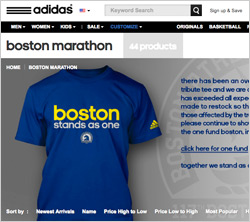
As Boston residents settle back into their daily routines, a handful of marketers are already way out in front in terms of speaking to consumers about last week’s dark events. But
while John Hancock, Ahold, Adidas and Rue La La may have gotten there first, other brands should follow, Craig Bida, EVP of Cone Communications, tells Marketing Daily. (Cone, which specializes in
cause-related marketing, is located on Boston’s Boylston Street, where the bombs went off during last week’s marathon.)
“After a tragedy, there is now an
expectation from consumers that brands should do something,” he says. “Our research has shown that 73% of people now think companies should somehow respond. But it’s important to
tread lightly, and not be tone-deaf. The bombing had a big emotional impact, so brand response should be sensitive.” (Food Web site Epicurious got blasted by its Twitter followers, for example,
who let it know that suggesting Bostonians whip up some cranberry whole-grain scones to feel better was stupid and crass.)
advertisement
advertisement
For companies with the closest ties to either the
marathon or Boston, the response was incredibly swift. Within 24 hours of the bombing, John Hancock, the event’s primary sponsor, donated $1 million to start the One Fund Boston, which will aid
those affected. Ahold, the Dutch parent of Stop & Shop, Boston’s leading grocer, kicked in $500,000. CVS and Dunkin’ Donuts ponied up $100,000 each. Within two days, the fund had
reportedly taken in $10 million in donations, and race sponsor Adidas had already run out of its “Boston stands as one” tribute tee-shirts.
It makes sense, Bida
says, that Boston’s homegrown brands would be among the first out of the gate with efforts to help, playing a leadership role. But no matter where a brand is based, it’s important to
follow basic rules, he says. While consumers are skeptical of all cause-related efforts, this tragedy brought it home, with scammers using Twitter to solicit funds for fake charities and selling
stolen marathon medals on eBay within hours of the bombing. “That makes it very important to be transparent about fundraising,” he says. Adidas, for example, was clear that it was giving
100% of proceeds for its tee-shirts, priced at $26.20, to the One Fund. And Boston-based Rue La La’s $20 tee-shirt, which reads “Tough proud brave free Boston,” is giving all net
proceeds to Emergency Medicine Fund at Massachusetts General Hospital.
It’s also important to give enough money to make an impression, he points out. “If other
brands are donating $100,000, and then people see you give $10,000, it’s obviously going to have less impact.”
Finally, he says, brands need to respond in a way that is
authentic. While most businesses throughout Boston were shut down on Friday during the intense manhunt for the suspects, for example, Dunkin’ Donuts stayed open in select areas to make sure cops
and emergency workers had access to coffee and donuts. “I’ve worked with a battery brand, giving away free flashlights during storms,” Bida says. “And believe me, no one ever
says,'Why are you trying to use this storm as a promotional opportunity?’ They say, 'I needed a flashlight -- thanks!’”
But for Bida, the week’s most moving
commentary came on ice, when Boston Bruin fans belted out the national anthem. Adds Bida: “That was a pretty powerful Boston moment.”